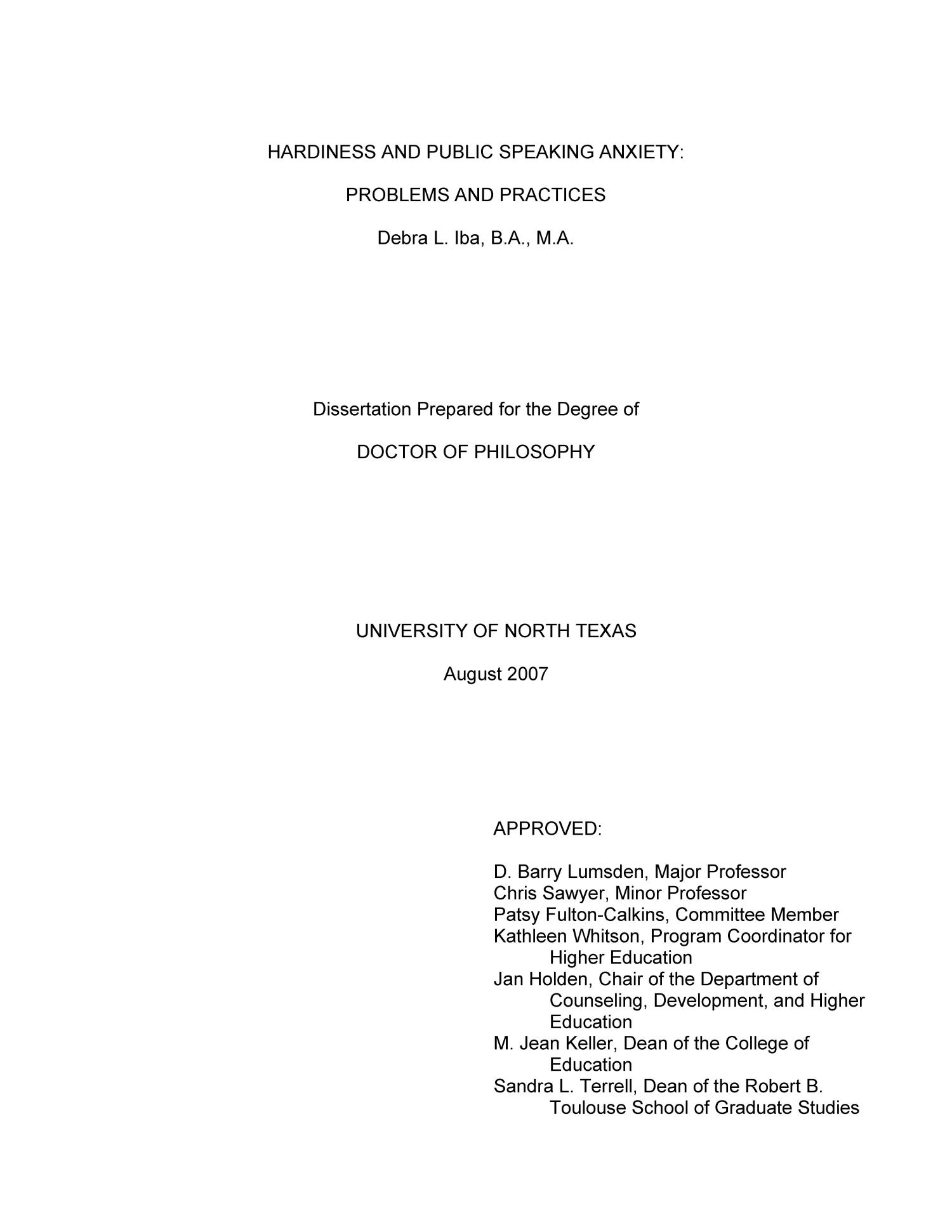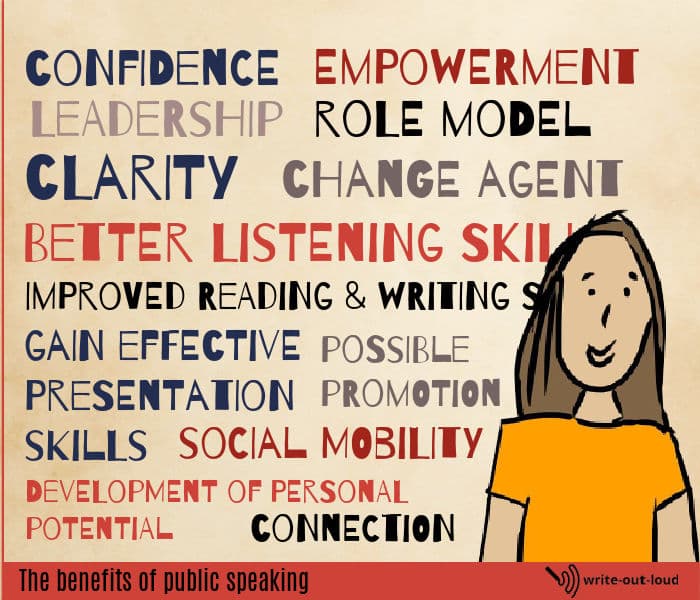Studies About Public Speaking
Numerous studies have been conducted on public speaking, revealing its impact on individuals’ confidence, communication skills, and career advancement. These studies provide valuable insights into the various aspects of public speaking and offer strategies for improving one’s delivery and overcoming anxiety.
Additionally, research has demonstrated the positive effects of public speaking training programs on individuals’ overall communication abilities, as well as their ability to influence and persuade others. With the growing importance of effective communication in both personal and professional settings, understanding the findings from these studies is crucial for individuals seeking to enhance their public speaking skills and achieve success in various domains.
By exploring the research findings in this field, individuals can gain practical knowledge and techniques to become more proficient and confident public speakers.

Credit: www.researchgate.net
Benefits Of Public Speaking
Public speaking is a valuable skill that can have numerous benefits in various aspects of life. By honing your ability to communicate effectively in front of an audience, you can unlock a whole new level of personal and professional growth. Let’s explore some of the key benefits of public speaking.
Improved Communication Skills
Public speaking offers a platform to enhance your communication skills. By regularly speaking in front of an audience, you become more articulate and develop the ability to convey your thoughts and ideas clearly. This also includes improving your listening skills as you actively engage with your audience.
Increased Confidence And Self-esteem
Confidence is a key attribute that can benefit you in various aspects of life. Public speaking helps in building this essential quality by pushing you beyond your comfort zone. With each successful presentation, your confidence grows, boosting your self-esteem and empowering you to take on new challenges.
Moreover, public speaking allows you to conquer any fear of being judged or criticized. You learn to overcome stage fright and develop the ability to present yourself with poise and assertiveness.
In addition to confidence, public speaking also enhances your overall self-image. Through public speaking, you learn to value your ideas and opinions, leading to a greater sense of self-worth.
Types Of Public Speaking
Public speaking encompasses various types such as informative, persuasive, and entertaining speeches. Studies reveal that honing public speaking skills can boost confidence and improve communication abilities.
Public speaking is a valuable skill that can help individuals communicate effectively and connect with their audience. Different types of public speaking serve distinct purposes. Understanding the various types can help speakers tailor their message and enhance their delivery. In this post, we will explore three common types of public speaking: informative speeches, persuasive speeches, and motivational speeches.Informative Speeches
Informative speeches aim to educate and enlighten the audience on a specific topic. These speeches provide factual information, whether it is about a historical event, a scientific concept, or a social issue. The goal of an informative speech is to deliver accurate information in an engaging manner, creating an understanding and awareness among the listeners. Informative speeches are often organized in a logical and sequential manner, presenting information in a clear and concise way. By using visual aids such as charts, graphs, or images, speakers can enhance their message and make it more memorable. For example, when giving a speech about climate change, a speaker may use a table to illustrate the increase in global temperatures over the years.Persuasive Speeches
Persuasive speeches aim to convince the audience to adopt a particular point of view or take a specific action. These speeches often involve presenting arguments, supporting evidence, and logical reasoning. The goal of a persuasive speech is to persuade the audience to change their beliefs, attitudes, or behaviors. When delivering a persuasive speech, speakers may use emotional appeals, personal anecdotes, or real-life examples to connect with the audience on a deeper level. By incorporating meaningful stories and relatable experiences, the speaker strengthens their argument and captures the attention of the listeners. For instance, when advocating for stricter gun control laws, a speaker may share a personal story of a tragic incident involving firearms.Motivational Speeches
Motivational speeches aim to inspire and motivate the audience. These speeches are often given in conferences, workshops, or other events where individuals seek personal or professional growth. The goal of a motivational speech is to uplift the spirits of the listeners, encourage them to overcome challenges, and pursue their goals with enthusiasm. When delivering a motivational speech, speakers often draw from their own experiences and share their journey towards success. By using powerful and uplifting language, speakers can ignite a sense of passion and determination in the audience. For example, a motivational speaker may use bold statements and impactful quotes to emphasize the importance of perseverance and self-belief. Overall, public speaking encompasses various types, each serving a unique purpose. Informative speeches provide knowledge, persuasive speeches aim to influence, and motivational speeches create inspiration. By understanding and utilizing these different types, speakers can effectively communicate their message and engage their audience. So, whether you’re informing, persuading, or motivating, remember to adapt your speech to the specific type and make a lasting impact on your listeners.Tips For Effective Public Speaking
Discover proven tips on how to be an effective public speaker backed by studies. Enhance your skills with practical guidance on content delivery, body language, and overcoming anxiety. Build confidence and captivate your audience with these expert techniques.
Introduction
Public speaking is a skill that can be intimidating for many people. However, with the right preparation and techniques, anyone can become an effective public speaker. In this section, we will explore some useful tips that can help you improve your public speaking skills and engage your audience. These tips include practicing and preparing beforehand, using visual aids to enhance your presentation, and finding ways to engage your audience throughout your speech.Practice And Preparation
To become a confident public speaker, practice and preparation are key. By practicing your speech beforehand, you can familiarize yourself with the content and identify areas that may need improvement. It also allows you to become more comfortable with the material, helping you to deliver a smoother and more natural presentation. Additionally, practicing your speech in front of a mirror or recording yourself can help you work on your body language and vocal tone. By preparing thoroughly, you can reduce anxiety and increase your confidence on the day of your presentation.Use Visual Aids
Visual aids can be powerful tools to enhance your public speaking. They can help you convey information more effectively and engage your audience visually. When using visual aids, such as slides or props, keep in mind the following tips:- Ensure your visual aids are clear, concise, and relevant to your speech topic.
- Avoid overcrowding your slides with too much text or complicated graphics.
- Use visuals to complement your spoken words and emphasize key points.
- Practice incorporating your visual aids smoothly into your presentation to avoid distractions or technical difficulties.
Engage The Audience
Engaging your audience is essential to maintaining their interest and attention during your speech. Here are some tips to effectively engage your audience:- Start with a compelling opening that grabs their attention and sets the tone for your speech.
- Make eye contact with your audience to establish a connection and build trust.
- Ask questions or encourage participation to involve the audience actively.
- Use storytelling or real-life examples to make your content relatable and memorable.
- Be enthusiastic and passionate about your topic to inspire your audience.
Overcoming Public Speaking Anxiety
Public speaking anxiety, also known as glossophobia, is a common fear that affects many individuals. The thought of standing in front of a large audience and delivering a speech can be overwhelming, leading to feelings of nervousness, sweating, and even panic. However, there are strategies and techniques that can help individuals overcome this fear and become confident public speakers. In this blog post, we will explore some effective methods for overcoming public speaking anxiety.
Identify The Root Cause
Before one can start working on overcoming public speaking anxiety, it is essential to identify the root cause of this fear. For some individuals, it may stem from a lack of confidence in their speaking abilities or fear of being judged by others. Others may have had negative experiences in the past that have left a lasting impact on their self-esteem. By identifying the specific triggers that contribute to public speaking anxiety, individuals can begin to address and overcome these fears.
Gradual Exposure
A gradual exposure approach is an effective way to overcome public speaking anxiety. Instead of jumping into a high-pressure speaking engagement, individuals can start by practicing their speaking skills in low-stakes situations. This could involve speaking in front of a small group of friends or family members, joining a public speaking club, or participating in mock presentations. By gradually increasing the level of exposure to speaking in front of others, individuals can build confidence and reduce anxiety over time.
Deep Breathing Techniques
Deep breathing techniques can be a powerful tool for managing public speaking anxiety. When individuals are anxious, their breathing tends to become shallow and rapid. This can further exacerbate feelings of anxiety and make it difficult to concentrate. By practicing deep breathing exercises before and during a speaking engagement, individuals can activate the body’s relaxation response and calm their nerves. One simple technique is to take slow, deep breaths in through the nose and out through the mouth, focusing on filling the belly with each breath.
Public Speaking In Various Settings
Public speaking is a skill that is required in various settings, ranging from business presentations to TED Talks and academic conferences. Each of these settings presents unique challenges and opportunities for speakers to engage their audience and deliver impactful presentations.
Business Presentations
When it comes to business presentations, effective communication is crucial for success. Business professionals often need to deliver presentations to clients, colleagues, or stakeholders, and they must be able to convey their ideas and information in a clear and persuasive manner.
In these settings, it is important to understand the audience and tailor the presentation accordingly. This may involve using charts, graphs, or other visual aids to support key points, as well as incorporating real-life examples or case studies to make the content more relatable.
Ted Talks
TED Talks have gained immense popularity in recent years, with their engaging and thought-provoking content. These talks are often delivered by experts in their fields or individuals with unique experiences and ideas.
To captivate the audience during a TED Talk, speakers must focus on delivering their message in a concise and compelling manner. This involves careful preparation and rehearsal to ensure each word and gesture is intentional. Additionally, incorporating personal stories or anecdotes can help to establish a connection with the audience and make the talk more relatable.
Academic Conferences
Academic conferences are platforms for researchers, scholars, and experts to present their findings and share knowledge with their peers. These presentations are typically more formal and require a deep understanding of the subject matter.
When speaking at academic conferences, it is important to convey complex information in a manner that is accessible to the audience. This may involve using visual aids, such as slides or charts, to present data or diagrams. Additionally, speakers should be prepared to answer questions and engage in discussions about their research.

Credit: keynoteworthy.com.au

Credit: www.globalpublicspeaking.com
Frequently Asked Questions Of Studies About Public Speaking
What Are The Benefits Of Improving Public Speaking Skills?
Improving public speaking skills can boost your confidence, enhance communication abilities, and pave the way for career growth.
How Can Public Speaking Skills Be Developed?
Public speaking skills can be developed by practicing regularly, joining Toastmasters or similar groups, and seeking constructive feedback from peers.
Why Is Public Speaking Important In Various Fields?
Public speaking is crucial in various fields because it allows you to effectively convey ideas, inspire others, and establish credibility as a leader.
Conclusion
To summarize, the studies on public speaking have shed light on its importance and the benefits it offers. From reducing anxiety to enhancing communication skills, mastering this skill is crucial in various aspects of life. As each study unfolds new insights, it becomes clear that with practice and proper techniques, anyone can become a confident and effective public speaker.
Embrace the learning process, and let your voice be heard!



